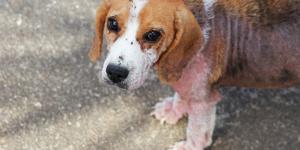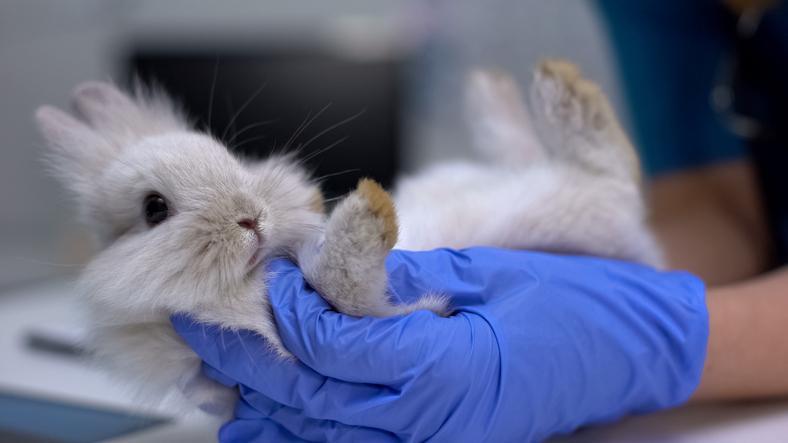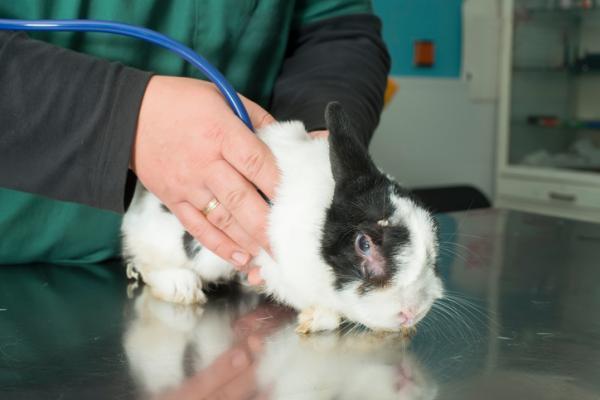How Do I Know If My Rabbit Has Mites?



See files for Rabbits
Has your rabbit been acting abnormally? Perhaps they've started scratching themselves more than often, or perhaps you've observed “moving dandruff” on their fur. Whatever it may be, you must be wondering how do I know if my rabbit has mites?
In this AnimalWised article, we'll be going through the symptoms, types and treatment of mites in rabbits. Continue reading to learn more!
What are mites in rabbits?
Mites are one of the external parasites that can affect your pet rabbit and it is relatively frequent that they do. In fact, it is one of the most common consultations from caregivers in veterinary clinics.
It's also important to know that there are different types of mites in rabbits. So if you've found some injuries on your rabbit's skin or noticed them scratching themselves more than usual, these are some of the signs that may indicate that they have mites. Let's dive deeper into the symptoms of mites in rabbits.
Symptoms of mites in rabbits
Mites affect the skin and the inside ear canal. As their human companion, it's quite easy for us to detect if there is a problem with our rabbit. Especially with mites as the symptoms are visible on their skin or their ear.
These are the most common symptoms when it comes to mites in rabbits:
- Skin thickening
- Patches of dandruff
- Head shaking (due to pain)
- Walking dandruff
- Dry skin
- Excessive scratching
- Patches of hair loss
- Skin wounds (crusts, redness, etc.)
These symptoms will make your rabbit have an abnormal behavior. They'll be scratching themselves more than usual, over-grooming, and shaking their head and ears due to the pain and stress. Their ears may also have a certain discharge, a bad smell, inflammation or a reddish brown coloration.
If you notice any of these symptoms, your rabbit most likely has mites. This is a very common health issue so there's no need to panic. Continue reading to learn how to treat it and how to prevent it from happening again in the future.
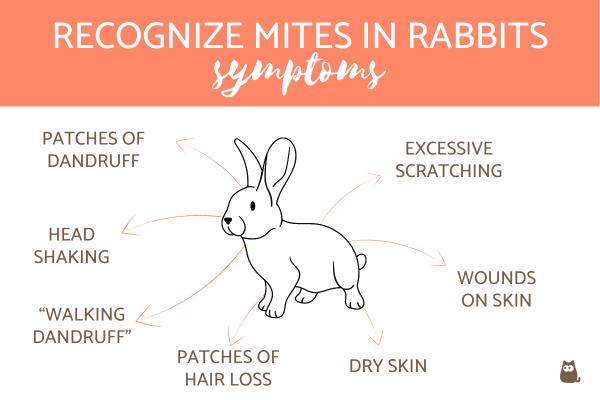
Types of mites in rabbits
There are several types of mites that can affect rabbits and cause them to suffer through the symptoms mentioned above. Mites can also cause rabbits with a weakened immune system to develop other health issues and diseases.
The most common types of mites are:
- Cheyletiella parasitivorax: these can also affect humans, however, they cannot complete their life cycle on humans. They appear as scales. In rabbits, they are common on their back and abdomen.
- Demodex cuniculi: these are rare. Rabbits with weakened immune systems are the ones with the highest risk of infestation. These mites can also affect a rabbit's ears.
- Leporacarus gibbus: often appear on the back of a rabbit. The symptoms are mild at most, and therefore, are difficult to detect.
- Notoedres cuniculi: these mites begin in a rabbit's muzzle and ears. They then extend through the head, limbs and even the tail.
- Sarcoptes scabiei cuniculi: these mites are more frequent in wild rabbits and are very dangerous to a rabbit's health. Nevertheless, domestic rabbits can also have these types of mites. These mites will cause wounds on the skin. Usually on the head, hands and genitals of a rabbit. Rabbits can also experience lethargy, loss of appetite, weight loss and even death.
- Psoroptes cuniculi: is very contagious. In fact, it can affect one or both ears, causing otitis. They can also spread to the head, neck and even to more remote areas, such as a rabbit's tail. These are easy to detect with the naked eye.
Treatment for mites in rabbits
Once you've detected mites in your rabbit, you will need to treat it as soon as possible. For this, you must go to the veterinarian. This is because only a professional can confirm or rule out their presence, as well as choose the correct treatment for their specific condition and overall health.
To do this, the veterinarian will take samples and observe them under a microscope so they can locate, classify the type of mite or the eggs and choose the right treatment for you rabbit. Once your veterinarian has determined what type of mite is affecting your rabbit, they will then choose the specific anti-parasitic for that species and the correct dosage for your rabbit.
In addition to administering the prescribed medication to your rabbit, closely following your veterinarian's instructions, you will also need to disinfect your rabbit's environment. Keep in mind that certain types of mites can also affect other animals and humans. Make sure to ask your veterinarian if you may be infected, your environment or other pets.
Mites in rabbits can be mild, but it can also be very serious. Some mite infestations advance to a rabbit's ears and eventually perforate their eardrum and cause neurological problems. The rabbit will be in so much pain and discomfort that they will stop eating and end up dying. This is why it's so important to take them to the veterinarian as soon as possible as only a professional can truly analyse the situation and find the proper treatment.
How to prevent mites in rabbits
As we've previously mentioned, mites in rabbits is fairly common. What varies is the severity of their condition. Although we cannot prevent them from getting mites altogether, we can lower their risk significantly by taking certain precautions. Here are our tips to prevent your rabbit from getting a mite infestation:
- Environment: keep your rabbit's cage and environment neat and clean.
- Other pets: remember to also monitor your other pets as mites can transfer from one animal to the other.
- Monitor: it's important to monitor our rabbit so we can observe any abnormalities in their fur, skin or behavior. Learn more in our article about symptoms of a sick rabbit.
- Regular check-ups: regular check-ups to the veterinarian will help up detect any health issues early on before they become a serious issue. Make sure to take them to the vet for regular check-ups every 6-12 months. Learn more about a rabbit's care in our article on vaccinations for rabbits.
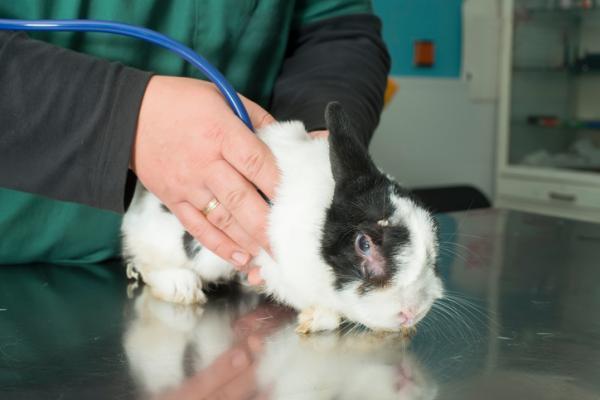
Are there home remedies against mites in rabbits?
There are plenty of home remedies online for rabbits with a mite infestation. However, the effectiveness is not ensured and you risk the infestation getting worse and your rabbit dying. For this reason, we recommend you go to a professional that can make sure your rabbit receives the proper treatment and recovers before it's too late.
This article is purely informative. AnimalWised does not have the authority to prescribe any veterinary treatment or create a diagnosis. We invite you to take your pet to the veterinarian if they are suffering from any condition or pain.
If you want to read similar articles to How Do I Know If My Rabbit Has Mites?, we recommend you visit our Parasitic diseases category.
- Bars, Juan. Veterinary Clinical Dermatology .
- Vázquez, Dacal and Panadero. (2006). Main ectoparasitosis of the rabbit . Cuniculture Bulletin nº 147. pp. 18-30.
- Krempels, D., Ph. D. (2008). Fur loss and skin problems in rabbits: Common causes and treatments [on-line]. Available: bio.miami.edu/hare/furloss.html#furmite
- Jeromin, Alice. (2008, May). Cheyletiella mites: Population on the move. DVM In Focus, 20-24.
- Van Pragg, E., Maurer, A., and Saarony, T. (2010). Skin Diseases of Rabbits (First edition). MediRabbit.com




